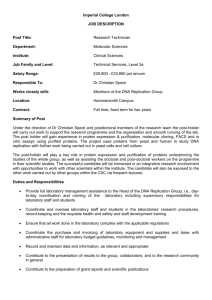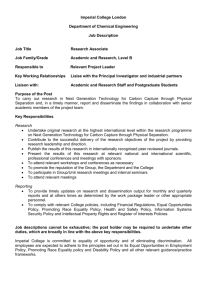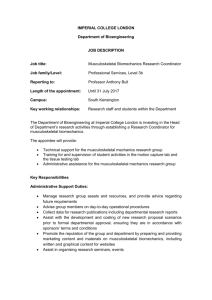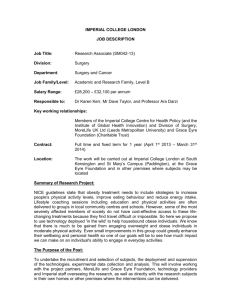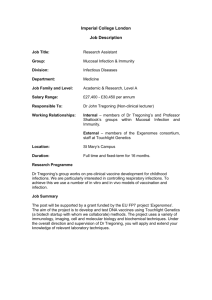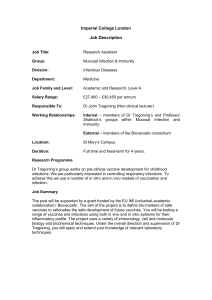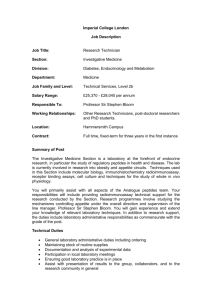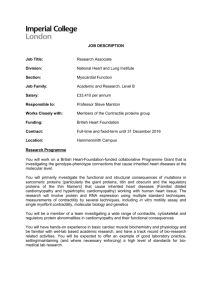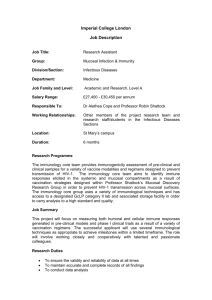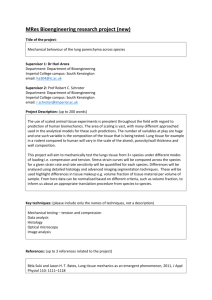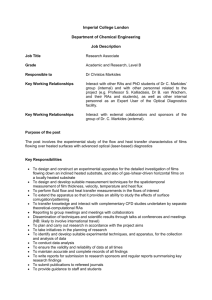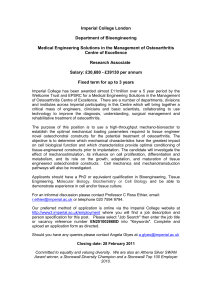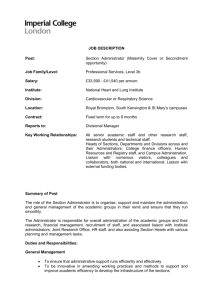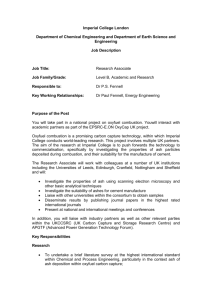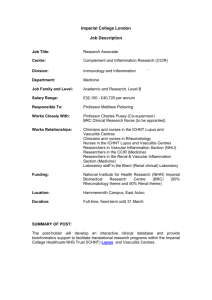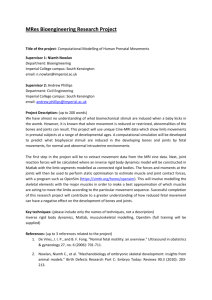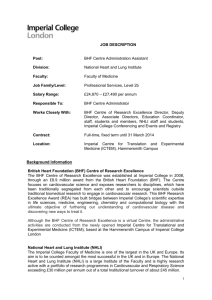Research Associate - Workspace
advertisement
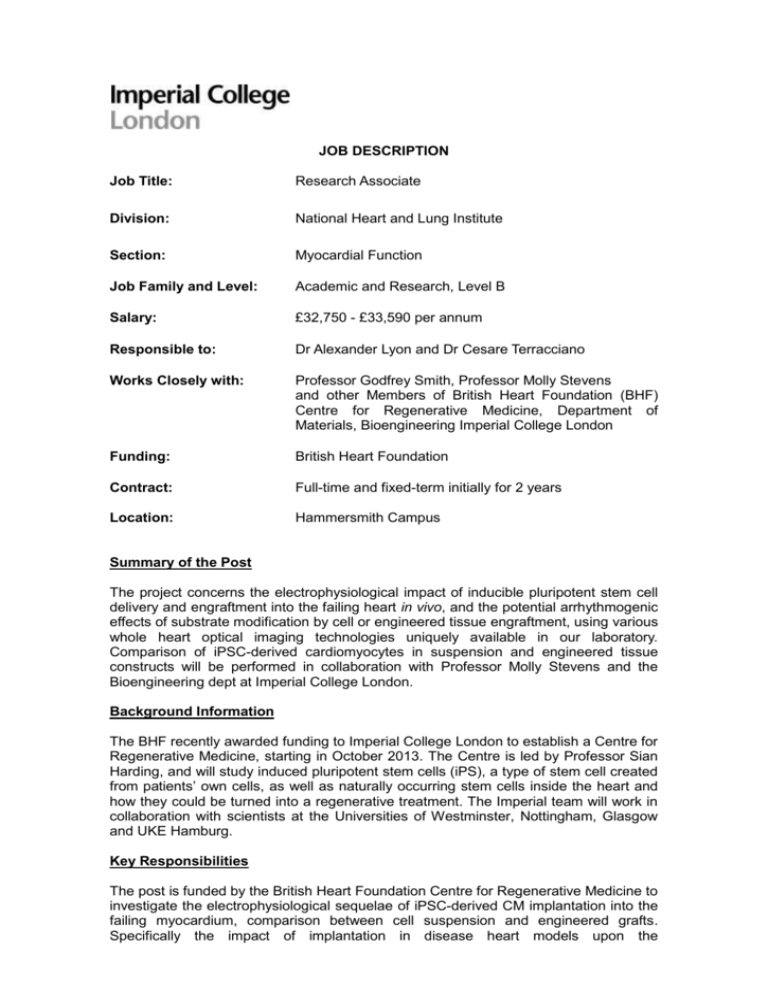
JOB DESCRIPTION Job Title: Research Associate Division: National Heart and Lung Institute Section: Myocardial Function Job Family and Level: Academic and Research, Level B Salary: £32,750 - £33,590 per annum Responsible to: Dr Alexander Lyon and Dr Cesare Terracciano Works Closely with: Professor Godfrey Smith, Professor Molly Stevens and other Members of British Heart Foundation (BHF) Centre for Regenerative Medicine, Department of Materials, Bioengineering Imperial College London Funding: British Heart Foundation Contract: Full-time and fixed-term initially for 2 years Location: Hammersmith Campus Summary of the Post The project concerns the electrophysiological impact of inducible pluripotent stem cell delivery and engraftment into the failing heart in vivo, and the potential arrhythmogenic effects of substrate modification by cell or engineered tissue engraftment, using various whole heart optical imaging technologies uniquely available in our laboratory. Comparison of iPSC-derived cardiomyocytes in suspension and engineered tissue constructs will be performed in collaboration with Professor Molly Stevens and the Bioengineering dept at Imperial College London. Background Information The BHF recently awarded funding to Imperial College London to establish a Centre for Regenerative Medicine, starting in October 2013. The Centre is led by Professor Sian Harding, and will study induced pluripotent stem cells (iPS), a type of stem cell created from patients’ own cells, as well as naturally occurring stem cells inside the heart and how they could be turned into a regenerative treatment. The Imperial team will work in collaboration with scientists at the Universities of Westminster, Nottingham, Glasgow and UKE Hamburg. Key Responsibilities The post is funded by the British Heart Foundation Centre for Regenerative Medicine to investigate the electrophysiological sequelae of iPSC-derived CM implantation into the failing myocardium, comparison between cell suspension and engineered grafts. Specifically the impact of implantation in disease heart models upon the electrophysiological substrate and ventricular arrhythmogenesis. The post will involve the development and application of novel state-of-the-art optical mapping technologies to interrogate the spatial patterns of electrical, calcium and energetic properties within the grafted cells and at the graft-recipient interface. You will be required to work closely with colleagues in the Centre for Regenerative Medicine and the National Heart and Lung Institute, and also the Department of Bioengineering at Imperial College. You will have responsibility for a series of laboratory studies extending from immunohistochemistry to whole heart Langendorff and working heart optical mapping studies, and in vivo heart failure models with cell implantation. You will undertake project management and be expected to become involved in the supervision of BSc, MRes and PhD students in related projects who are part of the research team, and will therefore be part of a multi-disciplinary team. In addition, you will be expected to submit publications to refereed journals and to attract external research funding. Research Duties To conduct and plan own scientific work with appropriate supervision and coordination with other Group members as required To collaborate with affiliated scientists of the BHF Centre and other researchers within Imperial College and elsewhere in London or abroad, as appropriate To maintain a highly organised and accurate record of experimental work To conduct data analysis, ensuring the validity and reliability of data at all times To identify and develop suitable techniques, and apparatus, for the collection and analysis of data To take an active part in the Group’s research meetings, internal seminars and academic activities of the BHF Centre To publish in high quality journals and to present data at national and international meetings To keep up-to-date with scientific advances in the field, including continuing professional development Assist in the supervision of undergraduate and postgraduate research students and research assistants as required To work outside of normal working hours (including weekends) if the requirements of the project demand Other Duties To undertake appropriate administrative tasks To attend relevant meetings To undertake any necessary training and/or development Any other duties which may arise commensurate with the grade of the post as directed by the Head of group, as well as the Head of Division/Department/Section To observe and comply with all College policies and regulations, including the key policies and procedures on Confidentiality, Conflict of Interest, Data Protection, Equal Opportunities, Financial Regulations, Health and Safety, Imperial Expectations (for new leaders, managers and supervisors), Information Technology, Private Engagements and Register of Interests, and Smoking. To undertake specific safety responsibilities relevant to individual roles, as set out on the College Website Health and Safety Structure and Responsibilities page (http://www3.imperial.ac.uk/safety/policies/organisationandarrangements). Job descriptions cannot be exhaustive and the post-holder may be required to undertake other duties, which are broadly in line with the above key responsibilities. Imperial College is committed to equality of opportunity and to eliminating discrimination. All employees are expected to adhere to the principles set out in its Equal Opportunities in Employment Policy, Promoting Race Equality Policy and all other relevant guidance/practice frameworks. IMPERIAL COLLEGE LONDON PERSON SPECIFICATION Qualifications Essential PhD in Physiology, Biophysics, Pharmacology or a closely related discipline Experience and Knowledge Essential Experience with ex vivo whole heart preparations e.g. Langendorff heart preparation, Working Heart preparation Desirable Experience in cardiac electrophysiology and arrhythmias Wide-field optical mapping of biological tissues, preferably cardiac Knowledge and experience of applying fluorescence dyes to study biophysical properties Immunohistochemistry Electrophysiological provocation protocols In vivo cardiac surgery techniques (human or research models) Skills and Abilities Essential Ability to critically review project progress, and to provide intellectual input into the continued development of research Ability to develop and apply new concepts Excellent written and verbal communication skills, with particular emphasis on writing succinctly for publication and on effective communication with scientific collaborators Proven organisational skills and ability to plan ahead, set priorities, and work to deadlines Ability and willingness to perform routine and non-routine tasks effectively and within deadlines Ability and willingness to adapt to changing timetables or work patterns as may be dictated by changing circumstances Ability to work independently and as part of a multi-disciplinary team Creative approach to problem-solving Advanced computer skills, including word-processing, spreadsheets and the Internet Other Willingness to work unsociable hours as work demands from time to time Willingness to work as part of a team and to be open-minded and cooperative Discipline and regard for confidentiality and security at all times Willingness to undertake any necessary training for the role Willingness to travel both within the United Kingdom and abroad to conduct research and attend conferences
